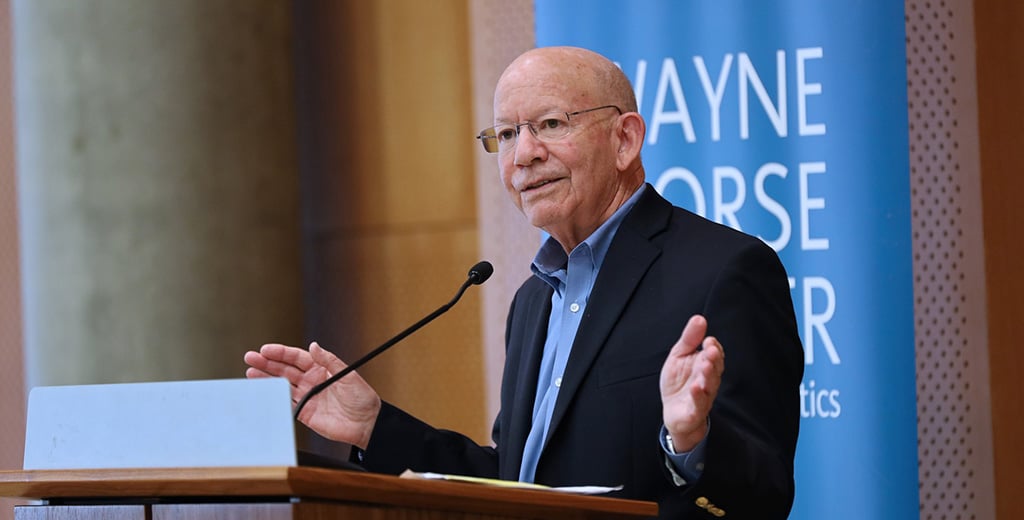 Photo Credit: Jack Liu
Photo Credit: Jack Liu
Peter DeFazio: A force for progress
After more than three decades in office, Peter DeFazio MA ’77 is retiring. DeFazio’s service and voting record is extensive with over 20,000 votes logged in Congress and his impact goes far beyond representing the people of southwestern Oregon.
Throughout his career, DeFazio has been someone who wasn’t afraid “to challenge the leadership of his own party or reach across the aisle to deliver solutions.”
“I don’t compromise on big values,” DeFazio says. “I’ll fight for them and if I lose, I lose. But to get things done you’ve got to be very pragmatic and willing to work within your value system.”
DeFazio has shaped American transportation policy as chairman of the US House Transportation & Infrastructure Committee. He led an 18-month investigation into Boeing 737 Max crashes that resulted in the deaths of 346 passengers. This was the most comprehensive oversight investigation in the committee’s history and improved federal aviation safety standards along with holding Boeing accountable. The Netflix documentary, Downfall: The Case Against Boeing, chronicles DeFazio’s work.
He also delivered $1.3 billion for infrastructure for roads and bridges, and broadband in Oregon. More recently, DeFazio has donated his papers, circa 1983-2022, to the UO Libraries Special Collections and University Archives. The papers document his nearly four decades of legislative work in the U.S. House of Representatives and include selected legislative, campaign, political, press, and personal files as well as selected constituent services, and audio-visual materials. Consisting of more than 700 storage boxes, the collection will be processed and should be available for researchers to access in the next three years.
“I feel good about the legacy that I have left; it’s been a great 36 years...but It's time to pass the torch,” says DeFazio.
His fierce advocacy began as a graduate student studying gerontology at the UO in the late 1960s. He recalls the environment on campus as “tumultuous” due to the frequent demonstrations that occurred. One demonstration to protect Oregon’s French Pete forest as wilderness interrupted his economics class.
“The windows were open. It was a hot fall day. And there was a chant, ‘Save French Pete! Save French Pete!’ The professor looks out and says, ‘Oh, there’s Ken Kesey and a group. I guess they’re going to march down to the BLM [Bureau of Land Management] office. It’s a beautiful day, and it’s a good thing to do so why don’t you all go along if you want.’”
So, DeFazio packed up his books and marched along with his classmates to the federal offices.
“I was a month in Oregon and I’d never seen anything like that before,” DeFazio recalls. “That was the beginning of my activist phase: French Pete and environmental issues, the secret war, and the bombing in Cambodia.”
That protest was the tipping point for DeFazio – and led him on a path of environmental conservation after receiving his master’s degree in 1977. During his career, he advocated for the largest expansion of wild and scenic rivers in the lower 48 states, led the fight to ban the export of logs from federal lands to protect old growth forests, and permanently protected over 390,000 acres of wilderness in the state of Oregon — an area half the size of Rhode Island.
If you have ever seen the majestic Douglas firs and western hemlock trees of Devil’s Staircase Wilderness, spotted marbled murrelets, northern spotted owls and Roosevelt elks in the Copper Salmon Wilderness, or explored the twisting passages within the Siskiyou Mountains of the Oregon Caves National Monument — you have DeFazio to thank.
Out of all his success in office, DeFazio looks back on his work with higher education as some of his most satisfying work. While in DC, DeFazio refused every congressional pay raise, and instead contributed over $400,000 to fund 295 scholarships at five Oregon community colleges.
Former University of Oregon president Michael Schill called DeFazio “a strong champion for students and research” for his support of federal financial aid and federal investment in scientific research and partnerships.
“Legislative achievements are one thing, but when you’ve really made a definitive difference in somebody’s life, that’s incredibly gratifying.”
With his retirement, DeFazio is giving up the longest commute in the lower 48 states and saying goodbye to bi-weekly transcontinental flights. Now, he and his wife Myrnie Daut MA ‘83 (industrial relations), who retired from the City of Eugene after more than 20 years in risk administration and senior leadership, will continue to make their home in Springfield, Oregon.
Along with gardening, they plan to enjoy the natural beauty of Oregon and the great outdoors.
“There are things that I want to enjoy...to hike in areas I created with wilderness...to write a book about America,” DeFazio says. “I'm not going away. I'm still going to be active, but it's going to be at my pace.”
– By Rayna Jackson, BA '04 (romance languages), director of communications for the UO Alumni Association